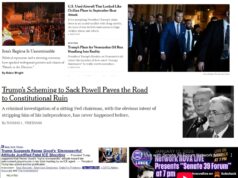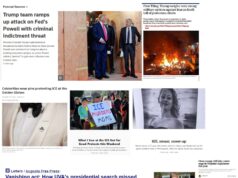Dear Senator Kaine, I hope you don’t mind my taking the liberty to address this to you. I do so for three reasons:
First, the ideas presented below may be important — not regarding whether or not Hillary Clinton wins the presidency but whether or not her presidency is successful.
Second, the news that you frequent Blue Virginia suggests the possibility that an idea posted here — that might be valuable to the Clinton/Kaine campaign — could get proper attention. And
Third, there’s a chance you remember me and a speech I gave in your presence when I was running against Bob Goodlatte in 2012. It was at a fundraising banquet in Harrisonburg, and some folks in Harrisonburg told me that when you came to town two weeks later, you were still speaking enthusiastically about that speech.
So for all those reasons, plus my passionate hope that our next president will be able to defeat the obstructionist intentions of the Republicans in Congress, I submit the following ideas to you for your consideration.
Andy Schmookler
***************************
“We Are Going to Win the War and We Are Going to Win the Peace That Follows.” — Franklin D. Roosevelt, two days after the attack on Pearl Harbor
Hillary Clinton must, of course, defeat Donald Trump. But, for her to have a chance for an effective presidency, she needs to prepare before Election Day for a campaign after the campaign. Here’s why.
Never in American history has it been so important for a President-Elect, if it’s Hillary Clinton, to make use of the period between the voting and Inauguration Day. That’s because she is up against the combination of two unfortunate factors:
- To an unprecedented degree, and through no fault of her own, Hillary’s election to the presidency would come without a mandate.
- The Republicans are poised to resume the same kind of obstructionism they’ve used to thwart President Obama.
The lack of a mandate is the inevitable result of Donald Trump’s continual domination of our political discourse. Trump’s extraordinary conduct and bizarre statements make the election a referendum on him. He has left Hillary little room to convey, in a meaningful way, her positive vision for America or her program for achieving it. If she wins, the most that can be said about the voters’ choice of a direction for America will be “not Trump’s way.”
Unless the victorious President-Elect Clinton goes beyond the usual transition process during the two-plus months leading to her inauguration, she would take office without the popular force she’ll need to overcome the Republicans’ plan to obstruct whatever she tries to accomplish.
(During the Obama presidency, obstructionism has worked well for the Republicans, politically, and they would have every reason to expect to be able to get away with it again, making it their priority to make President Hillary fail. And it remains quite likely that the Republicans will still have the votes in Congress to block all progress.)
But this problem has a solution.
Assuming Hillary becomes President-Elect, Trump will presumably lose his virtual monopoly on the attention of the media and the American people. This will give President-Elect Clinton a new opportunity to go with her new status. (“I will soon be your president” confers an entirely different status than “I want your vote.”)
With the stage cleared, Hillary can use the more than two months between Election Day and Inauguration Day order to enlist as many Americans as possible behind the measures she will first ask Congress to enact.
Success in this could preempt obstructionism before it begins.
The Republicans doubtless intend to continue to demonize her. But she can move the spotlight away from herself to specific measures capable of generating widespread support.
The call to “Block Hillary” could be exposed as a purely partisan effort to “block progress.“
This transformation of public perception would make the practice of obstructionism bad politics for, if the Republicans insist on blocking all progress on popular measures, they will run afoul of an angry citizenry.
Which leads to the question: How can Hillary generate the necessary level of public support after an election that she may win as the lesser of two evils?
Soon after the election, she could begin a series of speeches designed to convey two things:
- her vision of a better American, an ideal future, toward which she pledges to work to move the nation.
- several policies — that she will ask Congress to enact — to help move us in that direction.
The articulation of a vision — perhaps something akin to FDR’s great “I See an America” speech — should come first.
Then the choice of which policy proposals to present should be governed by a simple criterion: what will be most strongly supported by the broadest swath of the American people? That’s because it is the sheer force of public opinion on which Hillary’s hopes of pre-empting the obstructionists rest.
The preparation for this post-campaign campaign should begin now, because these speeches need to be as powerful as possible. To change the political dynamic between the new President and her Republican opponents in Congress, Hillary needs to hit the ball out of the park.
The objection might be raised: Wouldn’t it be foolish to divert attention and resources toward what she will do after a victory that has not yet been won? No. Preparing the President-Elect’s “campaign” should not interfere with the campaign to get her elected president.
Even the best possible speeches can be composed between now and Election Day with minimal expenditure of scarce resources by the Clinton campaign.
From the candidate herself, just a few hours of the candidate’s time should suffice — to elicit the components of her vision she wants to present, and to get her thoughts about which policies would be best to push. The rest of the preparation can be done by one or more excellent speechwriters. With the enormous resources at Hillary Clinton’s command, assigning one or several first-rate speechwriters the task should be a drop in the bucket.
FDR was already thinking about winning the peace even while the smoke was still rising from Pearl Harbor. He not only led us to victory in the war, he laid the foundation for a post-war peace that was an equally important and enduring achievement.
It is vitally important to keep Donald Trump from becoming president. Also essential is laying the foundation for a Clinton presidency able to move the nation forward.




![Sunday News: “Trump Is Briefed on Options for Striking Iran as Protests Continue”; “Trump and Vance Are Fanning the Flames. Again”; “Shooting death of [Renee Good] matters to all of us”; “Fascism or freedom? The choice is yours”](https://bluevirginia.us/wp-content/uploads/2026/01/montage011126-238x178.jpg)






